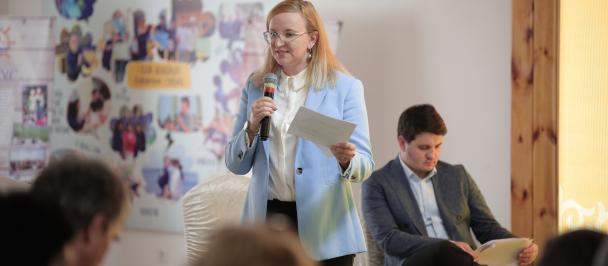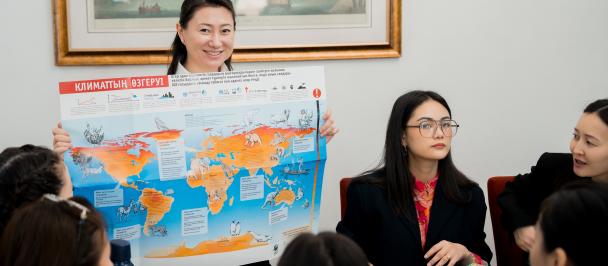September 21st, 2019
Satpayev sity, Karaganda region
Honorable Mayor of Satpayev city, Mr. Askar Idrisov,
Ladies and gentlemen,
I am glad to be here at the Regional Forum in Satpayev.
The world is developing at an unprecedented scale, and so are the cities. More than 58% of population in Kazakhstan currently lives in urban areas. Rapid growth helps create new opportunities, but it has also brought serious challenges, climate change being one of them.
It is very symbolic that we are convening here in Satpayev city right before the Climate Action Summit, as climate change presents one of the biggest threats to development, and, if not tackled, to human existence. Climate change permeates the whole Agenda 2030 and is embedded in across Sustainable Development Goals. Together, Agenda 2030 for Sustainable Development and the Paris Agreement on climate change, shape the global vision on transition towards zero-carbon and climate-resilient development.
Building cities that are resilient and sustainable, inclusive and safe – requires intensive policy work and investment choices. We applaud akims of 15 cities of Kazakhstan who took concrete actions towards low-carbon and climate-resilient development, facilitating deployment of renewables and promotion of energy efficiency.
With support of UNDP, Satpayev, Aktobe, Kapshagay and other 12 partner cities have developed and started implementation of low carbon development strategies. For the first time in the history of Kazakhstan, these cities have adopted greenhouse gas reduction targets with concrete financing instruments and business models.
Inter alia, these strategies incorporate energy efficiency measures that are estimated at 54.1 million US dollars of public and private investment. The finance is directed towards low-carbon investment projects, such as energy efficient retrofitting in social buildings of Satpayev. We also plan to demonstrate lighting solutions in five schools. These are energy-efficient lighting solutions within our Small Grants Programme that will result in estimated energy savings of up to 100,000 kWh a year and will benefit around 10,000 people,.
All these initiatives also serve as a key driver for creating “green” jobs, especially for youth. At the moment UNDP focuses on the work with young people in 6 cities, including Satpayev. We expose youth to new ideas and skillsets, including in renewable energy and energy efficiency. For example, last month we supported the launch of the co-working center “Jalyndy Jastar” to serve as a youth engagement platform. It will help young people to expand capacities through peer learning, building networks and encouraging productive engagement withtheir communities.
In cooperation with Akimat, UNDP has just launched an apprenticeship program for 90 youth of Satpayev (500 youth nationwide) to provide 3-month internships combined with professional trainings for young men and women.
Measures facilitating energy efficiency and promoting renewables at the municipal level feed into frameworks at the national and regional levels. They create an enabling environment for scaling up energy efficiency and deployment of renewables.
At the moment, we work jointly with the Ministry of Energy and Ministry of Industry and Infrastructure Development on the amendments to the relevant national legislation. The objective is to facilitate energy efficiency and promote renewable energy, with a particular focus on financial incentives and mechanisms.
Unlocking finance is critical for every country to implement its sustainable development agenda. Here, in Kazakhstan we introduce innovative solutions that facilitate access to finance, leveraging both public and private resources, and effectively address the risk-concerns of investors.
Innovated by UNDP and piloted jointly with Damu Fund, the financing mechanism for low-carbon investment projects attracted more than 46 mln. US dollars in private sector funding for energy efficiency in 2018 alone. The emission reduction target is 1,1 mln. tons of CO2 equivalent within the lifecycle of the projects financed. This financing mechanism helps reducing the interest rate for low-carbon “green” projects. This year the mechanism has been extended to support renewable energy projects as well, focusing on distributed renewable energy systems.
We call on businesses and local authorities to more actively engage in our projects in order to bring change to the communities we live in. Our teams are here and will make presentations today to give more details.
Let me thank the organizers of this Conference for the opportunity to share experiences, and for facilitating dialogue between governmental bodies, experts and potential investors to make sustainable future closer.
Thank you!

 Locations
Locations



